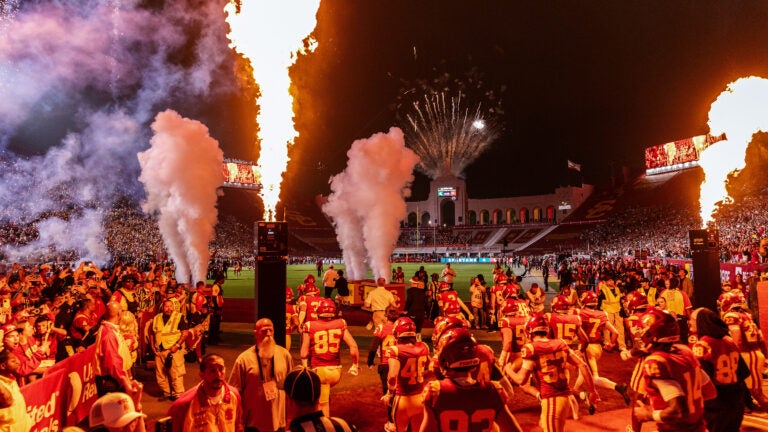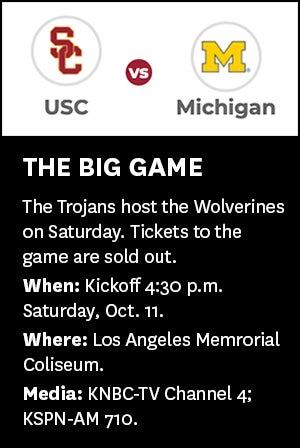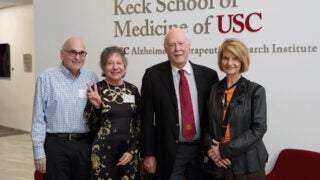
The Trojans — seen coming onto the field to face Michigan State on Sept. 20 — are using real-time data to make key decisions. (USC Photo/Bryce Dechert)
New USC Marshall research lab collaboration gives the Trojan football team a competitive edge
Conor McQuiston and a team of interns from Lorena Martin’s Trojans Sports Research Lab help provide strategic help to coach Lincoln Riley and his staff.
Conor McQuiston watches football a little differently than the average fan. That’s because he — by his own admission — knows more than the average fan. As the director of football analytics for the USC Trojans football team, McQuiston collects and analyzes data from the football team’s on-field performance. His work helps coaches make strategic decisions and provides players with insight into their game. In essence, if it can be measured, McQuiston is tracking it.
While most fans cheer when they witness a deep pass, a long run or a brutal tackle, McQuiston is asking: Why?
“When you get so close to something, you see how the details work,” McQuiston said. “My job is basically everything in between the lines: How is offense performing? How’s our defense performing? What is the other team doing in these situations?”
Earlier this summer, McQuiston reached out to Lorena Martin, assistant professor of clinical data sciences and operations at the USC Marshall School of Business, to help him assemble a team of interns to collect and analyze all that data from games and practices. Martin’s Trojans Sports Research Lab is dedicated to advancing human performance and health through cutting-edge research, technology and collaboration. Through the lab, Martin assigned seven students to intern with McQuiston and the USC football team, developing a crucial resource for USC head football coach Lincoln Riley’s analytics-driven philosophy.

“I’m really lucky to have such hard-working students,” McQuiston said. “It makes sense — being at a school like this — that there’s going to be so many hard-working, bright students, but they’ve been just such a huge help, taking weight off my shoulders and really contributing to helping us win games.”
A growing acceptance of analytics in sports
To secure a position like McQuiston’s, a person needs to be more than just a casual football fan. McQuiston is a football fanatic. Raised in a large East Coast Philadelphia Eagles-loving family with six siblings, he has loved the game for as long as he can remember. His father, grandfather and three of his brothers played football in college. While McQuiston did not continue in this tradition, jokingly attributing that to his lack of size, he went to the University of Michigan — a school that loves the sport as much as he does.
Originally a physics major, McQuiston soon realized he didn’t much care for physics research. Instead, he leaned into his love of data and joined the university’s football analytics club while still in school, eventually becoming an undergraduate analytics manager with the Michigan Wolverines football team. After graduating in 2021, he parlayed that experience and his own side research projects into an internship with Pro Football Focus, before moving into the professional ranks as an intern with the NFL’s Arizona Cardinals and eventually landing his job at USC earlier this year.
“I love football, but I’ve been a STEM guy, and I’m 5’8”, so this was probably my best path forward,” McQuiston said with a laugh.
Even though he is only four years removed from graduating college, he has seen the growing interest and acceptance of analytics in football. Once thought to be reserved for baseball, McQuiston said the football industry has come to embrace the value of data as he avoids using the word “trend.”
“It’s actually not like Moneyball, where everyone’s just staring at the numbers guy like, ‘What the heck are you doing here?’ Coaches have an idea of what it is,” McQuiston said. “Analytics is just gathering information, seeing what works, what doesn’t work, in a systematic manner, and doing things at scale.”
Tapping into USC’s academic prowess
Shortly after arriving at USC, McQuiston realized that to effectively do his job and provide the most insight he possibly could to the Trojan football team, he was going to need some help. That’s why he approached USC football general manager Chad Bowden about assembling a team of interns.
“We’re at one of the best academic institutions in America,” McQuiston said. “Surely, there’s at least a couple of students who like numbers and football and really want to work.”
In fact, there were more than “a couple.” According to Martin, the trouble wasn’t finding interns but narrowing down the applicants.
“We created basically a form where students fill out their interest — baseball, football, basketball, etc. — so we could also get a real idea of who intentionally likes football,” Martin said. “We want to send individuals that want to work in football and truly want to be in that environment.”
The Trojans Sports Research Lab is a project roughly 15 years in the making. Long before Martin arrived at USC, she wanted to create a space for sports research. Thanks to support from USC Provost Andrew T. Guzman, as well as USC Marshall Dean Geoffrey Garrett and USC Marshall Chief Financial Officer and Vice Dean of Finance & Administration Janet Horan, the lab launched this January with 25 members. Fast-forward eight months later, the group is now up to around 180 members and has partnered with one of the most iconic programs in all of college sports.
“It’s a sports marriage made in heaven,” Martin said with a laugh. “One of the things that makes our partnership a success is the trust we have with each other and the transparency between our two entities. Also, Conor is a rock star.”
Student experience
For USC graduate student Alejandro Pacheco, the opportunity to work with the USC football team was too good to pass up.
“It’s been an incredibly rewarding experience as I’ve been able to directly see the impact of my projects on a weekly basis,” Pacheco said. “Through various reports and engineering projects, I’ve been able to utilize the skills I’ve learned and apply them to a sport I’ve watched for almost my entire life.”
Pacheco, who is earning his master’s degree in computer science from the USC Viterbi School of Engineering, started interning with the team over the summer ahead of his arrival at USC. He said aside from being a football fan, the opportunity to work with Martin and other data scientists at the lab was a major selling point.
“It’s awesome to work alongside like-minded individuals who are passionate about sports and get constant feedback on the work I’m doing from those around me,” Pacheco said.
As data analytics in athletics — specifically football — continues to grow, students like USC senior Emily Mojica believe the experience of interning at the lab prepares them for a future in a constantly evolving field.
“Working with the Trojans Sports Research Lab and USC football has been an amazing way to combine my passions for football and engineering,” said Mojica, a computer science and business administration student at USC Viterbi. “With the DSO [Data Sciences and Operations] Sports Data Science and Management class and the guidance of Professor Lorena Martin and Conor McQuiston, I feel prepared to keep learning and succeeding in this field.”



